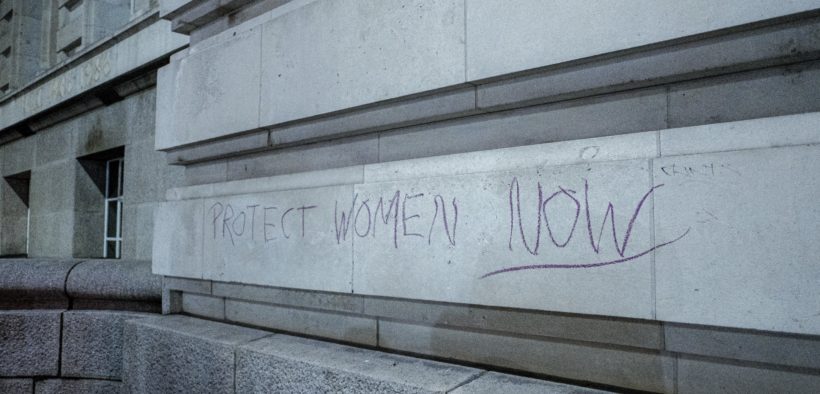Violence Against Women Act: Present and Future
Share

Image Credits: @theeastlondonphotographer on Unsplash (Unsplash License)
The Violence Against Women Act (VAWA) was a United States federal law and Title IV of the Violent Crime Control and Law Enforcement Act that expired in 2019 and is currently up for reauthorization. Signed by former US President Bill Clinton, VAWA provided 1.6 Billion USD towards the investigation and prosecution of violent crimes against women, acknowledged intimate partner violence (IPV), domestic violence, and sexual assault as federal crimes (in the case where state lines were crossed), and established a network of comprehensive and cost-effective coordinated community care among “law enforcement, prosecutors, victim services, and attorneys.” In addition, VAWA enhanced the sentencing of repeat federal sex offenders, mandated restitution to victims of specific federal assault offenses, and provided grants to state, local, and tribal law enforcement agencies to investigate violent crimes against women. The Act also created the Office on Violence Against Women within the Department of Justice, which worked to “administer justice for and strengthen services to victims of domestic violence, dating violence, sexual assault, and stalking.”
Background
The passing of the Act came after years of a surge in crimes against women. In fact, from 1960 to 1969, such violent crimes nearly doubled. The push for more legal protections for victims of assault and violence was further propelled by grassroots organizations in the 1970s as they rallied for change in the way cases of crimes against women were handled at the local and federal levels. Current US President Joe Biden, then a Senator from Delaware, began drafting the proposal in 1990 with the aid of the staff of the Senate Judiciary Committee. It was formally passed by Congress in 1994 and subsequently signed into law by President Clinton.
The VAWA is to be reauthorized every 5 years, and since its passing in 1994, it has been reauthorized 3 times in 2000, 2005, and 2013.
2000 Reauthorization
In 2000, Congress reauthorized VAWA through the Victims of Trafficking and Violence Protection Act. This reauthorization included additional protections for “battered nonimmigrants” and “new programs designed to protect elderly and disabled women,” in addition to “mandatory funds…used exclusively for rape prevention and education programs.”
2005 Reauthorization
In 2005, Congress reauthorized VAWA through the Violence Against Women and Department of Justice Reauthorization Act. This reauthorization created programs for Native American victims of domestic violence and assault as well as programs that addressed the public health issues that arose with domestic violence cases. It also expanded the federal criminal definition of stalking to include cyberstalking.
2013 Reauthorization
In 2011, VAWA expired after it failed to pass through Congress. In 2013, however, ample support from the public prompted Congress to reauthorize VAWA through the Violence Against Women Reauthorization Act. This reauthorization consolidated many of the previous programs created under VAWA and updated various definitions included in the Act. For example, the definition of domestic violence was changed to include “intimate partners,” in addition to “current and former spouses,” including protections for more victims.
Crimes Addressed Under the Act
VAWA provides protections for victims of a variety of crimes. Some of these protections include:
Domestic Violence and IPV
Domestic violence refers to felony and misdemeanor crimes, such as sexual assault or homicide, that are committed by spouses, ex-spouses, boyfriends or girlfriends, ex-boyfriends or ex-girlfriends, or by individuals who share a child with the victim. After the implementation of VAWA, domestic violence charges decreased by nearly 70% for women and by 87% for men above the age of 12. A 2021 survey indicated that in the United States, nearly 1 in 4 women are victims of domestic violence and 1 in 9 are victims of IPV.
Sexual Assault
Although sexual assault takes on various definitions, VAWA programs define sexual assault as “any nonconsensual sexual act proscribed by Federal, tribal, or State law, including when the victim lacks the capacity to consent.” Additionally, up until 2012, the legal definition of sexual assault and rape only included female victims but was recently updated to include offenders and victims of any gender identity. In 2017, the number of reported sexual assaults nearly doubled to 40%, yet this number decreased to just 25% in 2018. With VAWA gradually expanding such programs, the rate of assaults has continued to decline.
Dating Violence
VAWA defines dating violence as “violence committed by a person who is or has been in a social relationship of a romantic or intimate nature with the victim.” A relationship is determined by the following factors: the length of the said relationship, the type of relationship, and the frequency of contact between the individuals in the relationship. According to the CDC, nearly 1 in 11 women and 1 in 14 men in high school have reported physical dating violence in the past year.
Stalking
Although the legal definition of stalking differs across states, federal law makes it unlawful to travel across state lines or use mail/electronic communication services with the “intent to kill, injure, harass, or intimidate another person.” Some forms of stalking include making unwanted phone calls, waiting at certain locations for the victim, leaving unwanted items or presents for the victim, or spreading information/rumors about the victim through a social media platform. According to the CDC, 1 in 6 women and 1 in 17 men have experienced or will experience stalking in their lifetime.
2019 and 2021 Reauthorization Efforts
After the 2013 reauthorization of VAWA, the Act was set to be reauthorized in 2019. Despite passing through the US House, efforts to reauthorize stalled in the US Senate, and the Act ultimately lapsed under former President Trump. However, President Biden has made the reauthorization of VAWA one of his top priorities in domestic policies. The House recently passed the Act with a 244-172 vote, but VAWA faces challenges in the Senate. The bill includes a provision that would exclude an individual charged with domestic violence or stalking from purchasing a firearm. Thus, several GOP lawmakers in the Senate either oppose the bill or support some form of a bipartisan compromise.
Additionally, studies have shown that cases of domestic violence, IPV, and other forms of aggravated assault have risen during the COVID-19 pandemic due in large part to individuals staying at home and working from home. Even though calls to law enforcement regarding domestic violence have dropped by 50%, experts believe that “victims were unable to safely connect with services.”
The 2021 reauthorization was updated to build upon currently existing programs while aiming to expand resources for victims from minority communities. Additionally, Democrats have expanded the Act to include “provisions tightening access to firearms by people convicted of a violent crime or subject to a court order, and expanded protections for gay, bisexual and transgender people.” These provisions also include expanded protections for Native American and Alaskan Native victims. Today, nearly 4 in 5 Native American and Alaskan Native women will experience physical violence from a spouse or partner in their lifetime, but this reauthorization will allow for a federally recognized tribe to have jurisdiction over a non-Native American perpetrator. In fact, Representative Sheila Jackon Lee (TX-18), called the Act “a culturally sensitive initiative that protects immigrant women, it protects Native Americans, it protects poor women.” In addition, the Act will also include added protections for transgender prisoners when they receive housing assignments.
These provisions, however, have sparked a backlash from conservative Republicans. Representative Steve Chabot (OH-1) called the updated act “a vehicle to promote [the Democratic Party’s] far-left political agenda,” centered around gun control and other gay and transgender rights. Representative Marjorie Taylor Greene (GA-14) pushed to amend the law to include more firearms and self-defense training for women, instead of agreeing to bar individuals convicted of domestic violence or assault from purchasing guns. A Republican-controlled Senate led to the lapsing of the Act in 2019, but now in 2021, Democrats will need 10 Republican votes to officially send the Act to Biden.
How Effective is VAWA?
Every time that VAWA is reauthorized, it is updated to close any loopholes and expand protections for victims. While the overall effectiveness of the Act is hard to measure quantitatively, it has begun to change the narrative around how crimes like domestic and sexual violence are viewed. Once considered a “private family matter,” domestic violence is now recognized as a punishable crime in all 50 states. Another study found that IPV cases have decreased by nearly 60% in recent years, and more victims are willing to report instances of such abuse and violence. From an economic perspective through a US Department of Justice study found that “persons who received protection orders experienced a decrease in violence, resulting in a savings of $85 million in averted costs in just one year in [Kentucky].”
Although VAWA currently faces major challenges in the Senate, should it be reauthorized once more, it would be monumental for protections for victims of violence and would help to further change the conversation around women’s safety.


Want to get involved?
Connect with us! Connect with us!